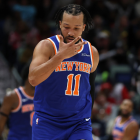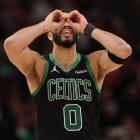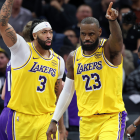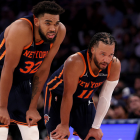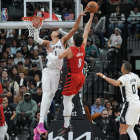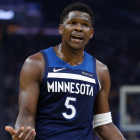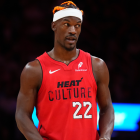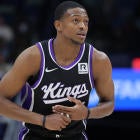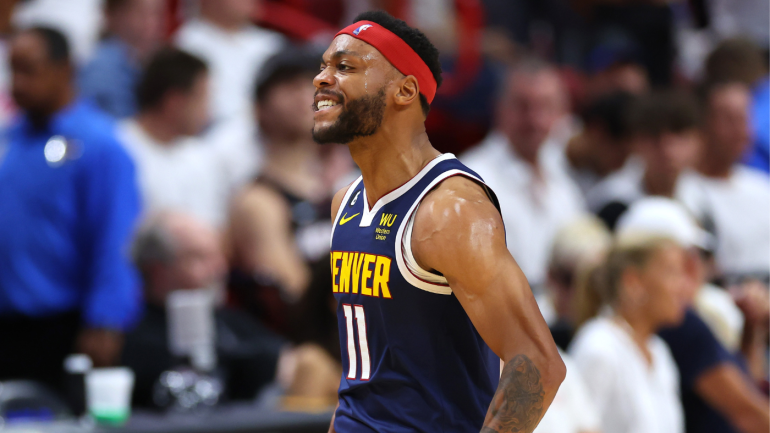
Bruce Brown has been overlooked for his entire NBA career. He fell to the second round of the 2018 NBA Draft, where he was taken by the Pistons and shipped out of Detroit for another second-round pick two years later. He flourished in an unconventional role with the Brooklyn Nets, but when Ben Simmons was acquired to play a more expensive version of that same role, his time in Brooklyn came to an end. His free-agent market was tepid. A total of 31 players earned more money than he did on the open market last season when he settled for Denver's taxpayer mid-level exception.
Now that deal looks like one of the best signings from last summer. Brown has emerged as Denver's top reserve, a Swiss Army wing that has played virtually every position for the Nuggets at some point this season. When Michael Porter Jr. is slumping, as he was in Games 2 and 3 of the NBA Finals, Michael Malone can scale his minutes up and play him at forward. When the coach wants to rest Jamal Murray and Nikola Jokic at the same time, he turns to Brown as his backup point guard and shot-creator. As he proved in Brooklyn, he can even function as a center offensively, masterfully operating out of the short-roll when used as a ball-screener.
The 6-foot-4 Brown can credibly defend just about any non-center in the NBA. He's grown into a consistent, league-average shooter on low volume. He's an elite offensive rebounder for his size, a deceptively dangerous driver and a sorely underrated passer. This is not the sort of player that the Nuggets should have had access to for just $6.5 million this season.
If there was any doubt that he was getting a pay raise this offseason, it was extinguished in a stellar Game 4 of the NBA Finals. With Nikola Jokic sidelined for much of the fourth quarter due to foul trouble, Brown stepped up and scored 11 of his 21 points to help secure the Nuggets' 108-95 victory that pushed the Heat to the brink of elimination. That stellar stretch might have effectively clinched Denver's first championship, but it may also have sealed Brown's fate as a future ex-Nugget.
Brown's contract includes a player option for $6.8 million next season. There is no chance whatsoever that Brown picks up that option. If nothing else, Brown is eligible for a 20% raise through his Non-Bird Rights that would allow the Nuggets to pay him roughly $7.8 million next season, a price they'd surely be willing to pay. The problem for Denver is that the Nuggets have no legal way of paying him any more than that.
The Nuggets are far above the salary cap, so creating space isn't feasible. The taxpayer mid-level exception was lowered to $5 million as part of the new collective bargaining agreement, so Denver can't use it to give Brown a raise. They have almost $160 million committed to eight players, and the first luxury tax apron is projected to come in at around $169 million, so giving him the non-taxpayer mid-level exception would be effectively impossible. Signing a player for the non-taxpayer mid-level exception hard caps teams at the first apron.
Even if Brown was willing to return for the $7.8 million Denver can offer, the Nuggets would then run into problems with the far more punitive second apron, which is projected to come in between $179 and $180 million next season. The worst penalties associated with crossing that line won't kick in until the 2024-25 season, but plenty of teams are reportedly treating that line as a functional hard cap.
That will likely be especially true of the relatively frugal Nuggets, who have paid the tax only four times since 2001, and more importantly, hadn't done so under the more punitive 2011-17 CBA rules until this season. Don't expect a team that hasn't even spent for a dedicated practice facility to start shelling out the kind of cash it would take to keep this core together. That's simply unrealistic. So Brown, for now, appears to be the likeliest financial casualty.
Are there pathways to paying Brown a fair price? Sure, but they are narrow. Say, for instance, that the Nuggets decide they'd rather keep the 26-year-old Brown as their starting shooting guard than the 30-year-old Kentavious Caldwell-Pope. If the Nuggets could deal Caldwell-Pope without bringing back any salary, they could potentially turn around and offer Brown the non-taxpayer mid-level exception, which will start at $12.2 million. They'd then be hard-capped at the first apron, giving them roughly $22 million to spend on their remaining 10 roster spots. That wouldn't be easy, but it helps that another key reserve, Christian Braun, is locked into a rookie scale deal. The Nuggets would presumably fill out the rest of their roster with ring-chasing veterans and a few rookies. Not ideal, but possible, especially since Jokic's durability mitigates most of the depth-related injury concerns similarly top-heavy rosters face.
A more palatable solution for Denver would be convincing Brown to return on another one-year deal with a player option for a second season. He'd still be limited to $7.8 million in salary for next season, but he'd set himself up to become a free agent again in 2024, when he'd have Early Bird Rights. While Denver can't agree to do so in advance, they could re-sign him at that point for a deal starting at 175% of his previous salary, taking him much closer to fair, market value. Of course, this approach passes a ton of risk onto Brown. If he gets hurt, or if his performance declines, or even if the Nuggets simply decide they'd rather not pay him, he has no recourse.
All of this makes it far likelier that Brown simply gets paid by another team this summer. There will be no shortage of suitors at that $12.2 million mid-level number. Some of the cap space teams might even go higher. How valuable would Brown be to a team like the Houston Rockets, which desperately needs to set a culture of defense and toughness? How about the San Antonio Spurs, whose squads have historically thrived with similarly versatile role players during the Tim Duncan years, and now find themselves looking for veterans to put around Victor Wembanyama? The Oklahoma City Thunder just paid Lu Dort $82.5 million last offseason. It's not a stretch to suggest that some teams could value Brown similarly.
It's a frustrating reality for a Denver organization that identified an undervalued role player who has helped get it on a path to a championship, but the new collective bargaining agreement was designed to spread talent around the league. Brown has been underpaid and underappreciated throughout his entire career. He's finally getting the credit he deserves on the court, and he'll soon have suitable contract off of it.









